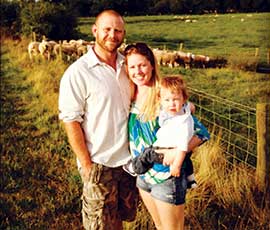Fursdon new entrants competition winners revealed

Share farming to charcoal production and just about everything in between were some of the impressive business plans submitted by individuals and young couples seeking a foot on the farming ladder.
More than 100 people came forward with their ideas to run 24ha Rixham Farm, which forms part of David and Catriona Fursdon’s 300ha mixed farming estate near Cadbury in Devon.
Three months ago, the Fursdons invited Farmers Weekly and land agent Smiths Gore to help find the right pto run Rixham Farm. They were looking for strong practical farming skills, a well-constructed business plan and the vision to work with the Fursdons to develop the assets on the wider estate.
| Road to Rixham |
|---|
|
As chairman of the Future of Farming Review, was adamant this opportunity should be open to all. So the exercise to find Rixham Farm tenants was less prescriptive, and more flexible, than a conventional letting option to encourage alternative business models, explained Steve Talling from Smiths Gore.
Disappointingly, however, no one put forward an alternative business plan to the conventional Farm Business Tenancy (FBT).
Most applications were based around a core agricultural business, with some form of diversification to add value. The exercise highlighted those with strong business acumen and experience in writing business plans and the three shortlisted exemplified the strength of the field.
Winners: Luke and Emily Knight
Luke and Emily Knight (pictured above) won over the judges with a simple-to-execute plan, a unique skillset and passion to succeed. The couple will bring a new dynamic to Rixham Farm, the local community and the whole estate.
Their ability to apply their plans immediately was a significant factor, along with practical farming skills, a track record of working closely with their local community and a new event business.
The Knights didn’t offer the highest rent tender, but their ability to harness the wider assets of the estate helped fill the gap. “We were looking for an entrepreneurial couple – and Luke and Emily really fitted the bill,” said .
“Out of all the business plans, they didn’t predict the most revenues, but it was the most robust and likely to be the most sustainable,” added .
The Knights were the “best fit” for the estate – likely to add value over the estate long term by working with the Fursdons for the mutual benefit of both parties.
The couple have already moved into the farmhouse and taken a crop of silage for a recently secured cattle B&B contract.“This opportunity is life-changing – we are moving from a two-bed flat to a lovely farmhouse,” said .
Their plan is to maintain the farm as a traditional grassland unit for their sheep flock, selling finished lamb and also rearing suckled beef and veal.
They are crossing three different breeds – Llyn, Texl and Berrichon – to get strong mothering ability, prolificacy and meat conformation, as well as hardiness.
They hope to increase their existing flock of 80 ewes to 250 by year three. But flock size is clearly limited by the small acreage, so the Knights will be developing several other income streams.
Mr Knight is already a qualified careworker and they are providing care for four people four days a week, which will bring in an immediate income. But the plan is to grow this side of the business further after six months.
The daycare adults will work on the farm, carrying out livestock tasks, learning about nature, making dormouse and bird boxes and producing kindling.
“We can offer individuals a unique opportunity to experience rural life, picking up agricultural skills along the way,” he said.
Mrs Knight’s degree in business management and experience in setting up an events business, Blanc Canvas, will be harnessed to develop the huge opportunities that exist at Fursdon Estate, which has a potential tea room, flat “marquee” area overlooking the valley and existing public footfall from the estate’s gardens.
Luke has an established contracting client base in east Devon and owns much of his own kit, so he expects to augment the farm’s income with bale wrapping, fencing and haulage work locally.
Runners-up: Jason Down and Helen Richardson
Creating a Fursdon brand built on traditional values and quality were central to Jason and Helen’s pitch. Using Mr Down’s 18 years’ experience as a farmworker on a local mixed farm at Ottery St Mary and Ms Richardson’s business management degree, as well as sales and marketing skills, the couple were an impressive team with a strong business case.
Mr Down’s family run two local pubs and these were to be the main outlets for lambs from a lowland sheep flock, beef from a herd of Red Ruby Devons and pork from Large Black pigs. They believed the local breeds would be unique selling points. The couple’s ambitions also stretched to a marketing and branding campaign and investment in chilling and storage facilities in the future.
Runners-up: Richard and Lucy Warren
The Warrens built a compelling case to expand their own 41-head Mule flock to 200, lambing them from the last week of February to produce Mule-cross ewe lambs. They also hoped to raise outdoor piglets and invest in on-farm facilities to make and dry-cure salami.
They also wanted to create a firewood and charcoal business, as well as hosting retreat residential courses.
The couple needed a large capital investment to deliver the business plan, but their projected returns, along with the way the plan fully integrated the resources within the estate, were impressive.
